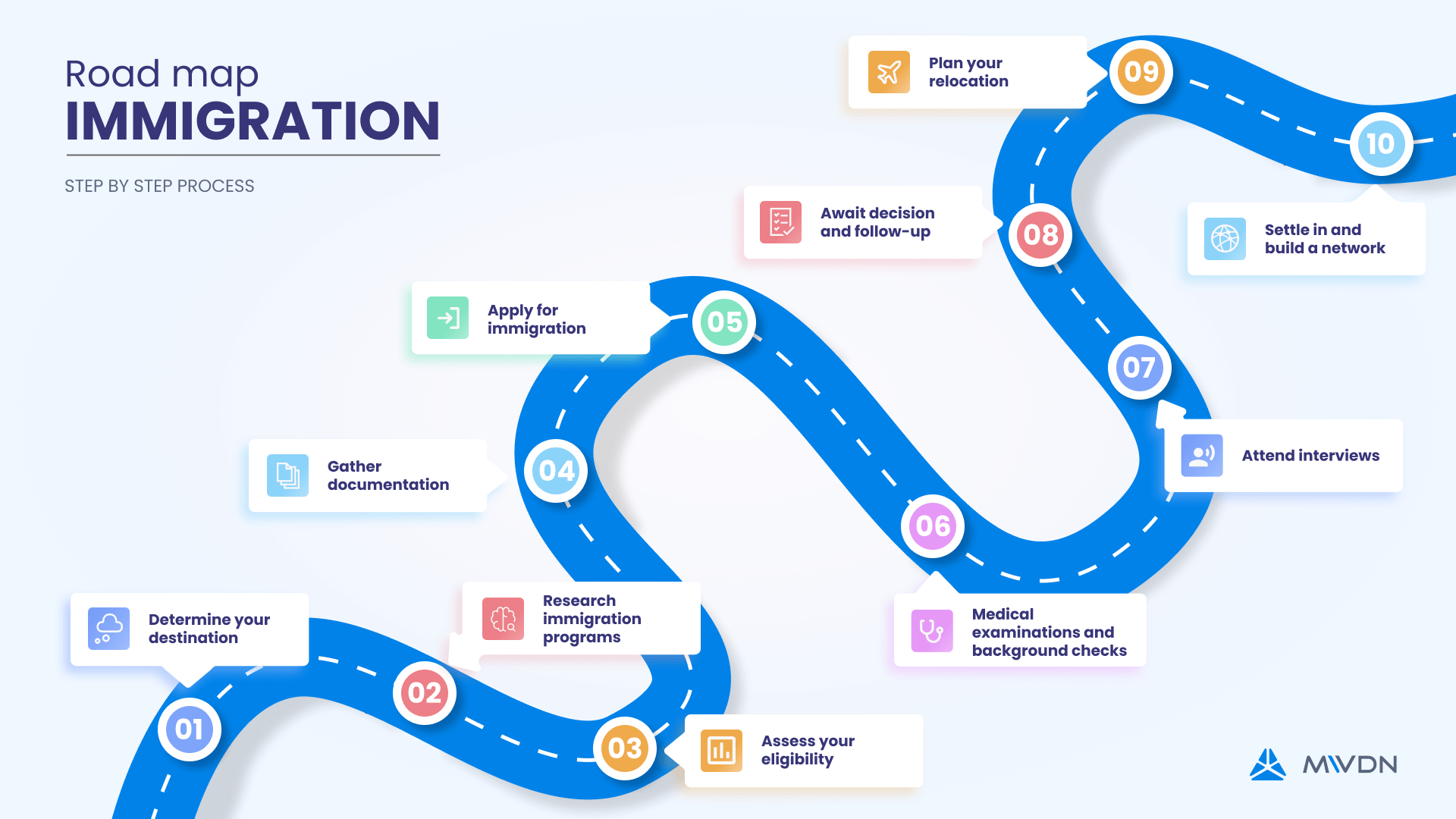
This is the final part of our series of articles about salaries and taxes for software developers around the globe and immigration policies in the most developed economies. In this piece, we analyzed all the data we explored to provide you with a short and coherent immigration roadmap.
The benefits of moving abroad
If you still doubt whether you should try yourself abroad, think about all the bonuses you will get. When you pursue a career as a software engineer in a different country, you get extensive possibilities and opportunities, and these are just some of them.
- Expanded job opportunities. Apart from local companies in tech-savvy societies, you can access multinational enterprise-level companies like Google, Meta, or Alibaba.
- Higher salaries and better benefits. Relocating to a country with a higher cost of living but higher salaries can lead to improved financial prospects and a better standard of living.
- Exposure to new technologies and practices. By moving abroad, you expose yourself to new technologies, tools, and methodologies that can enhance your skill set and make you more competitive in the global job market.
- Professional growth and learning. You will encounter diverse work cultures, collaborate with international colleagues, and develop a broader perspective on software engineering practices.
- Cultural immersion and personal development. Relocation is an extraordinary experience that will broaden your horizons, foster personal development, and enhance your adaptability and cross-cultural communication skills.
- Networking and collaboration opportunities. Building connections with professionals from different backgrounds can lead to collaboration opportunities, knowledge sharing, and the chance to expand your professional network.
- Enhanced career prospects. Employers often value candidates with a global perspective and the ability to adapt to different environments, which can lead to better career prospects in the long run.
Difficulties and pitfalls you should expect
Don’t stay focused on positive changes, though. Consider and evaluate the difficulties you might face when moving abroad.
- Immigration and visa processes. Yes, we provided several options on visas to different countries, and they might look easy to handle, but they are certainly not. Getting a working visa is a time-consuming, stressful, and usually expensive experience. Be aware of that.
- Language and cultural barriers. Adapting to cultural norms, customs, and work practices, learning a new language, and still having a language barrier can take time and effort and be extremely frustrating.
- Job market and competition. Most visas we described require you to have a job offer from a company inside a country. Remember that the job market for software engineers can be competitive, especially in popular tech hubs. It may take some time to secure a job that matches your skills and expectations.
- Cost of living and financial considerations. Research and plan your expenses. Housing, taxes, healthcare, insurance, transportation… Consider the local salary levels and whether they align with your financial expectations.
- Work culture and expectations. Adapting to new work practices, communication styles, and management approaches may require flexibility and patience. Observe and try to understand the local work environment to integrate effectively into the team and company culture.
Here is a quick example of this difficulty from our colleague at MWDN, Pavlo:
“A decade ago, I spent several years in Vietnam, working for a big tech company as a team lead of software developers. I loved the weather, the food, the salary, and the lifestyle, but I couldn’t get used to their working regime! In my team, only the first part of the day (which started at 7 a.m., though) was efficient and productive. After lunch, people were napping, talking, playing games, and drinking coffee, and it was okay.
When I asked one of my developers to try being more efficient during his working hours, he said I was toxic and resigned. My managers were not pleased that I was “too pushy,” even though I was extremely polite and extraordinarily delicate”.
- Social integration and support system. Moving to a new country means leaving behind familiar social networks and support systems. Building new friendships, finding community support, and adjusting to the local social dynamics can take time.
- Homesickness and emotional challenges. Adjusting to a new environment, being away from family and friends, and coping with the stress of a new job and lifestyle can impact your well-being.
By researching and preparing for potential difficulties in advance, you can help mitigate the challenges and make your relocation smoother and more successful.
Immigration roadmap

Even though the immigration process can vary significantly depending on the country and specific program you choose, there are some general milestones you should achieve. When making the first step towards relocation, we advise you to use every bit of help and information you can find. Namely, you should consult with immigration lawyers, utilize official government resources, and stay updated on the latest immigration policies and regulations to ensure accuracy and success in your immigration journey.
- Determine your destination. Research and identify the countries that align with your career goals, lifestyle preferences, and immigration policies. Consider factors such as job opportunities, work-life balance, cost of living, and cultural fit.
- Research immigration programs. Explore the immigration programs available in your chosen destination. Look for programs specifically tailored for software developers, such as tech talent programs or skilled worker visa categories. Understand the eligibility requirements, documentation, and application procedures for each program.
- Assess your eligibility. Evaluate your qualifications and assess whether you meet the eligibility criteria for the chosen immigration program. Factors such as education, work experience, language proficiency, and age may be considered. If you don’t meet the criteria, identify areas for improvement, such as gaining more experience or enhancing your language skills.
- Gather documentation. This may include educational certificates, employment letters, language test results, passport, and other supporting documents. Ensure that your documents are authentic, translated (if necessary), and meet the specific requirements of the immigration program.
- Apply for immigration. Submit your immigration application according to the guidelines provided by the immigration authorities. Follow the instructions carefully, complete all forms accurately, and provide all requested documents. Pay attention to deadlines and any associated fees.
- Medical examinations and background checks. Some immigration programs require medical examinations to ensure you meet specific health standards. Additionally, background checks, including criminal record checks, may be conducted.
- Attend interviews. Depending on the immigration program, you may be required to attend an interview or provide additional information. Prepare for the interview by familiarizing yourself with the program requirements, practicing common interview questions, and gathering any additional documentation that may be requested.
- Await decision and follow-up. Once you’ve submitted your application, it may take some time for the immigration authorities to process it. Be patient and await the decision. Keep track of the status of your application and follow up with the relevant authorities if necessary. Be prepared to provide any additional information or documents that may be requested during the processing period.
- Plan your relocation. This includes organizing travel arrangements, securing accommodation, and preparing to transition to your new country. Figure out the local customs, regulations, and practical matters such as healthcare, banking, and transportation.
- Settle in and build a network. Once you’ve arrived in a new country, take the time to settle in and adjust to your new environment. Build a professional network by attending industry events, joining tech communities, and connecting with local professionals. Explore job opportunities and contribute to the tech ecosystem in your new home.
***
If the only reason why you’re considering relocation is getting access to international projects, we have a safer option for you. Check out the positions opened by our clients – large companies and startups from around the globe. Drop your resume to our recruiters, and let’s find out if we have a match!
